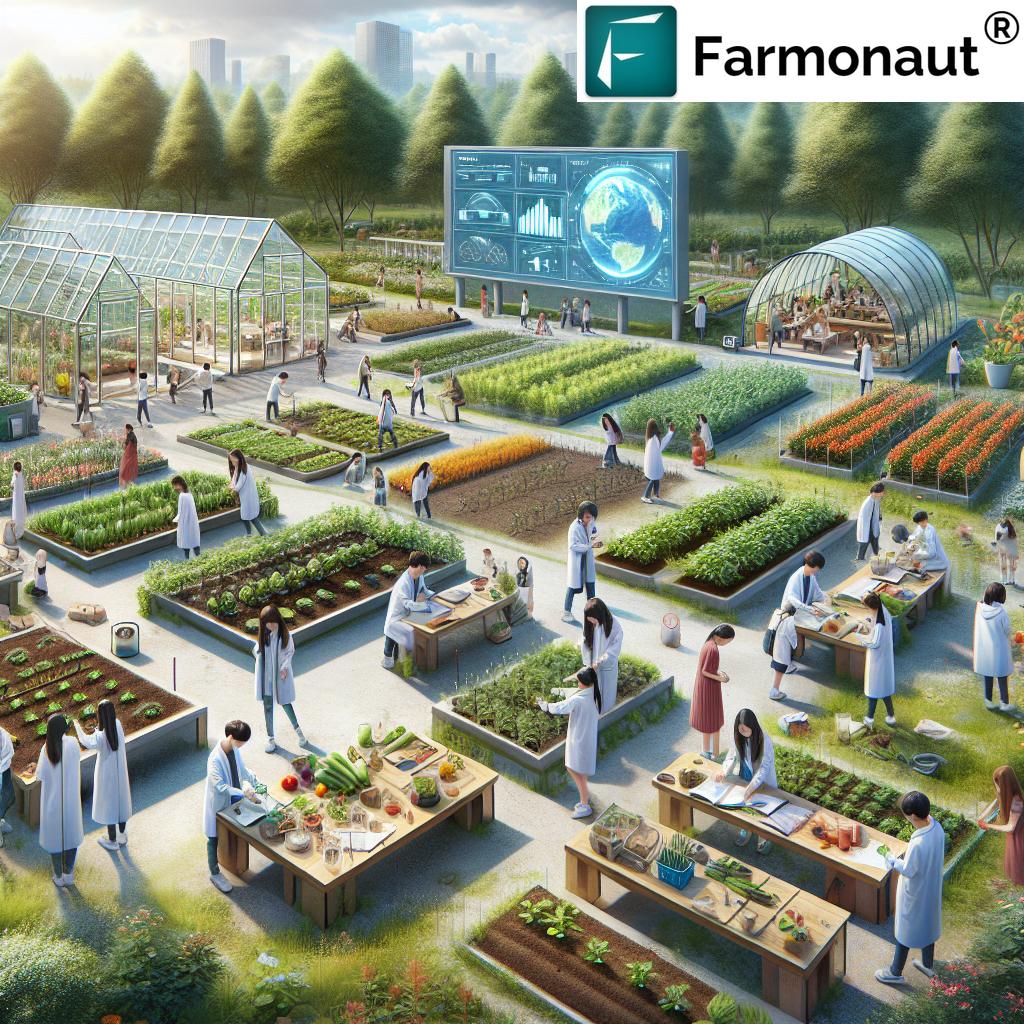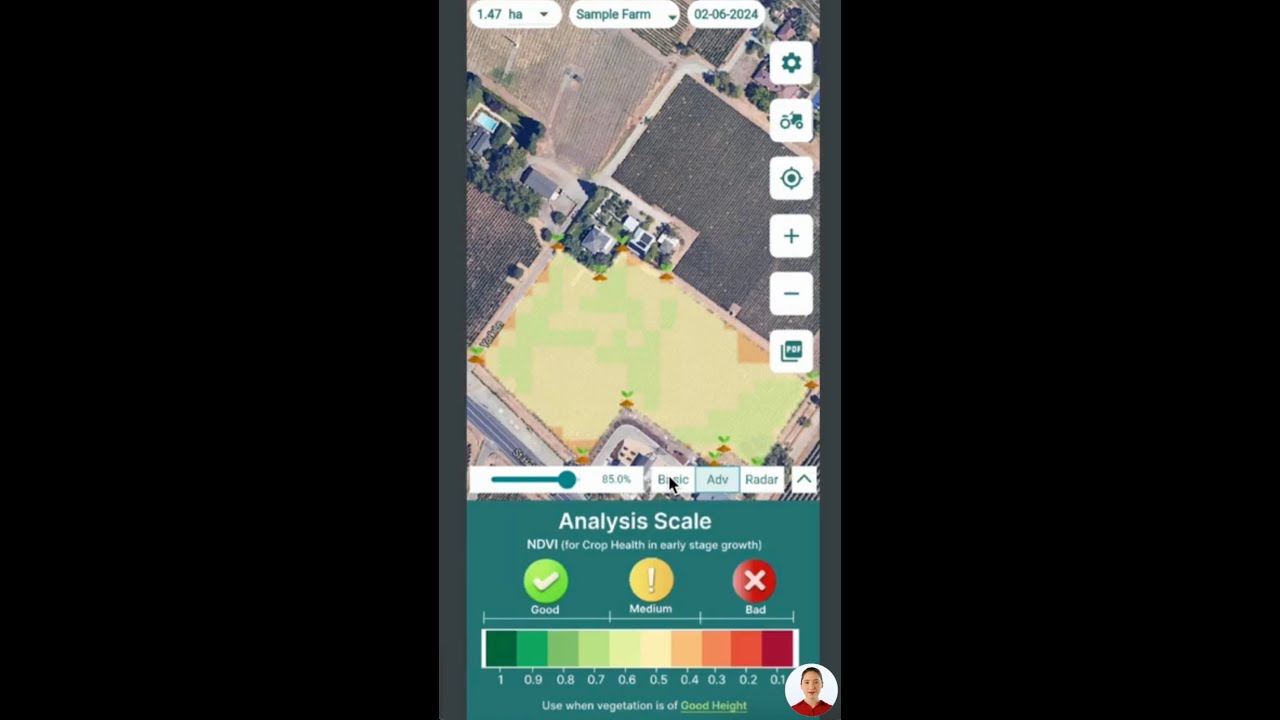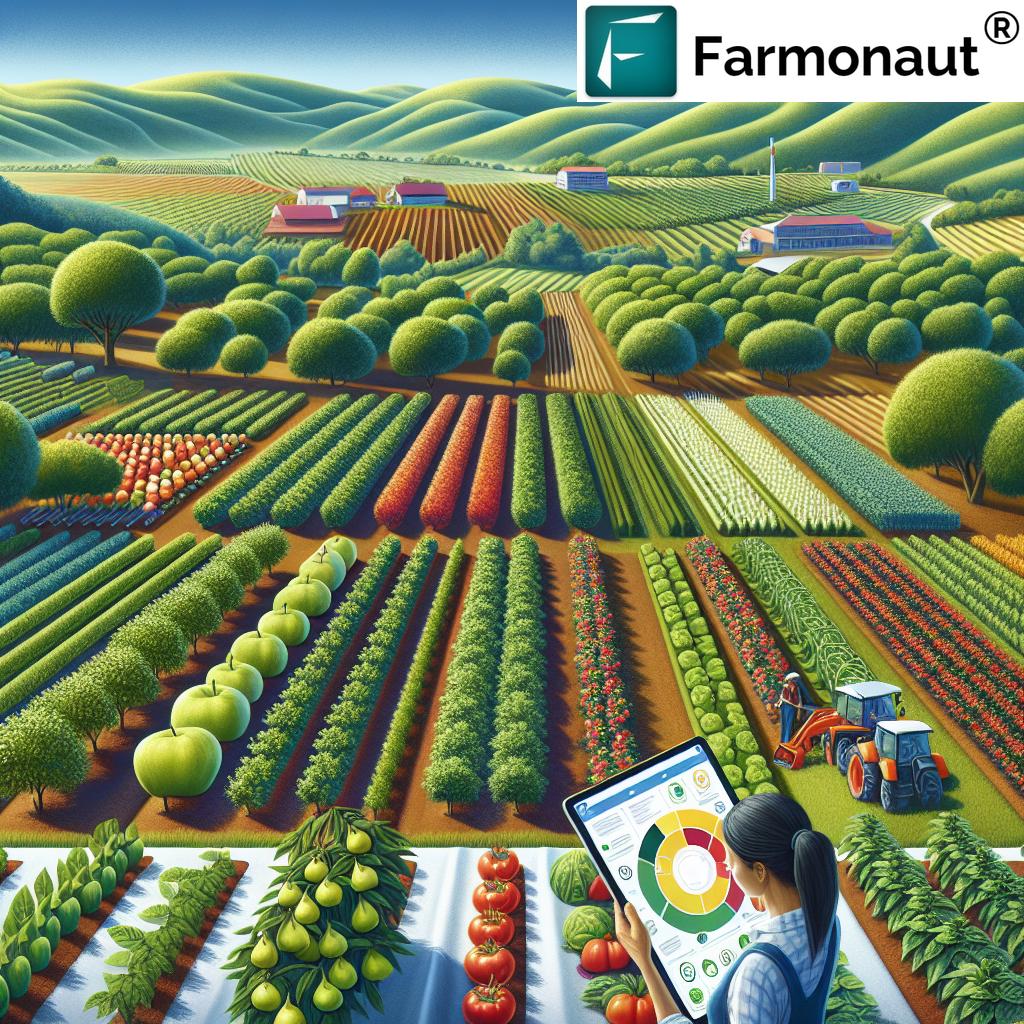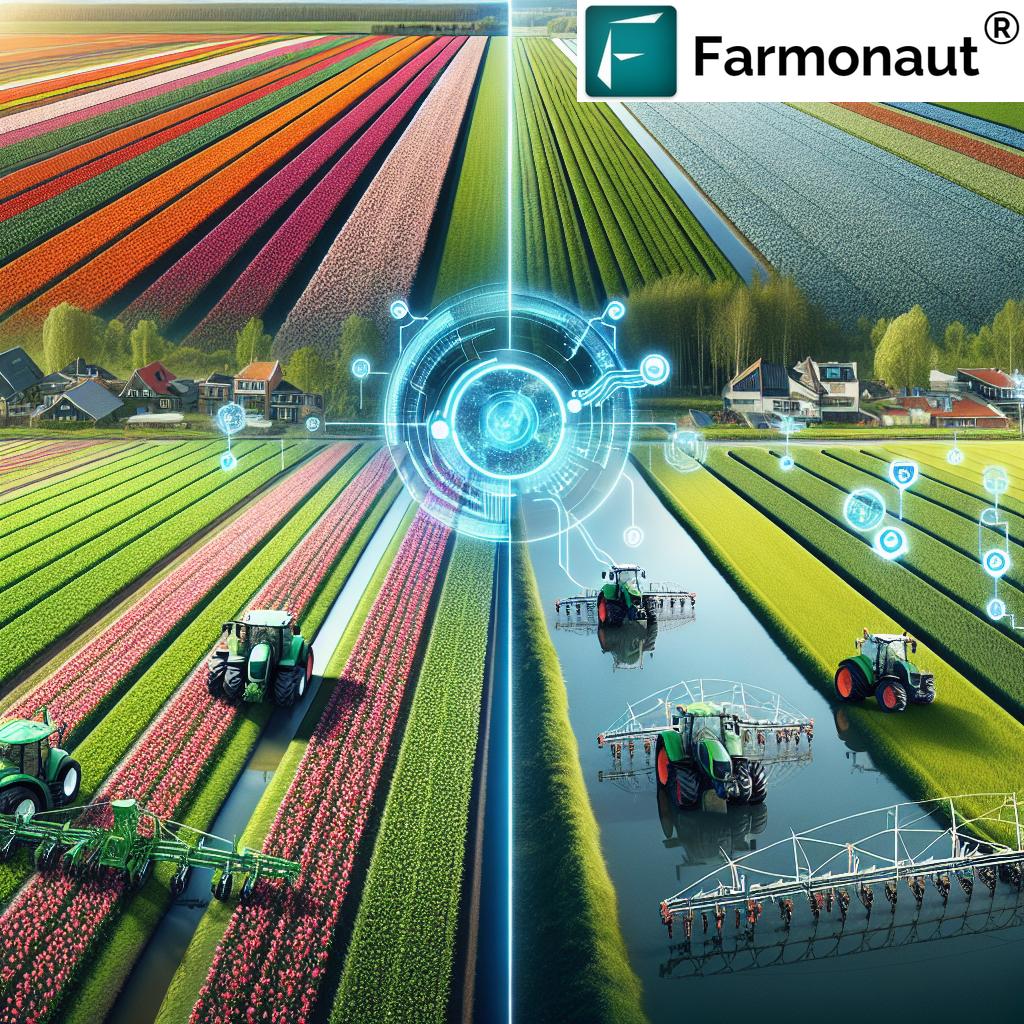Revolutionizing Agricultural Education: Farmonaut’s Interactive Farm-to-School Initiative in Warsaw County

“Warsaw County’s farm-to-school initiative engages 100% of students in hands-on agricultural learning, from tower gardens to soil experiments.”
In the heart of Warsaw County, a revolutionary approach to agricultural education is taking root, transforming the way students learn about food production, plant science, and sustainable farming practices. We’re excited to share with you the inspiring story of Farmonaut’s Interactive Farm-to-School Initiative, a program that’s not just educating students but cultivating the next generation of agricultural innovators.
The Seeds of Change: Introducing the Farm-to-School Initiative
At Farmonaut, we believe that the future of agriculture lies in the hands of today’s youth. That’s why we’ve partnered with Warsaw Community High School to bring the farm directly into the classroom. This innovative program, spearheaded by Emily Kresca, an agriculture and natural resources extension educator for Purdue Extension – Kosciusko County, is designed to immerse students in the world of agriculture through hands-on learning experiences.
The initiative is part of a six-session course for 13 students in Mandy Bailey’s Step One junior class. Step One, an advocacy program, helps students navigate the complexities of high school while exploring their future ambitions. By integrating agricultural education into this program, we’re not just teaching students about farming; we’re planting the seeds for potential careers in agriculture.
Cultivating Knowledge: The Core Components of the Program
- Tower Garden Experience: A centerpiece of the initiative is the tower garden set up in the classroom. This vertical growing system allows students to cultivate fresh vegetables right in their learning environment, providing a tangible connection to the food production process.
- Plant Science Curriculum: Students delve into the fascinating world of plant biology, learning about growth cycles, nutrient requirements, and environmental factors affecting plant health.
- Soil Science Experiments: Through hands-on experiments, students explore soil composition, pH levels, and the crucial role of soil health in agriculture.
- Agricultural Industry Insights: The program offers a comprehensive overview of the agricultural sector, highlighting its importance in our daily lives and the global economy.
- Nutrition Education: Students learn about the nutritional value of different crops and the importance of a balanced diet, fostering healthy eating habits.
- Career Exploration: Interactive sessions and personality assessments help students discover potential career paths in agriculture, from agronomy to agricultural technology.
The Impact: Transforming Education and Inspiring Future Agriculturists
The Farm-to-School Initiative is more than just an educational program; it’s a catalyst for change in how we approach agricultural education. By providing students with hands-on experiences and real-world knowledge, we’re fostering a deeper understanding and appreciation for the agricultural industry.
“The program introduces students to over 50 potential career paths in agriculture, fostering future industry professionals.”
Let’s take a closer look at the impact of this innovative approach:
| Learning Area | Traditional Classroom | Farm-to-School Program | Benefits |
|---|---|---|---|
| Agricultural Knowledge | Textbook-based learning | Hands-on experience with tower gardens and soil experiments | Enhanced understanding of farming processes and challenges |
| Hands-on Experience | Limited practical activities | Daily interaction with growing plants and agricultural technologies | Improved retention of information and practical skills development |
| Nutrition Awareness | Basic nutritional information | Direct connection between food production and nutritional value | Increased interest in healthy eating and food choices |
| STEM Skills | Theoretical STEM concepts | Applied STEM through plant science and soil experiments | Enhanced problem-solving and critical thinking abilities |
| Career Exploration | Limited exposure to agricultural careers | In-depth exploration of diverse agricultural professions | Expanded career horizons and interest in agricultural fields |
Farmonaut’s Role: Bridging Technology and Agriculture
At Farmonaut, we’re committed to making precision agriculture accessible and affordable for farmers worldwide. Our involvement in the Farm-to-School Initiative aligns perfectly with our mission to integrate innovative technology and data-driven insights into traditional farming practices.
Through our satellite-based farm management solutions, we’re able to provide students with real-world examples of how technology is revolutionizing agriculture. Our platform offers valuable services such as:
- Real-time Crop Health Monitoring: Students can visualize how satellite imagery is used to assess crop health and make informed decisions.
- AI-based Advisory Systems: Our Jeevn AI demonstrates how artificial intelligence can provide personalized farm management advice.
- Blockchain-based Traceability: Students learn about the importance of transparency in the food supply chain.
- Resource Management Tools: We showcase how technology can optimize water usage and reduce waste in farming.
Explore Farmonaut’s API to see how we’re making agricultural data accessible to developers and businesses.
The Learning Journey: From Seed to Harvest
The Farm-to-School Initiative takes students on a comprehensive learning journey that mirrors the agricultural cycle. Here’s how we break it down:
- Planting the Seeds of Knowledge: Students begin by learning about different crop varieties and their growing requirements.
- Nurturing Growth: Through daily care of the tower garden, students understand the importance of proper plant nutrition and environmental control.
- Monitoring and Analysis: Using Farmonaut’s technology, students learn to interpret data on plant health and growth patterns.
- Problem-Solving in Agriculture: Students are presented with real-world agricultural challenges and use critical thinking to develop solutions.
- Harvesting Results: As plants mature, students experience the satisfaction of harvesting their own produce and learn about post-harvest handling.
- From Farm to Table: The program concludes with lessons on food preparation and nutrition, emphasizing the farm-to-table concept.
Sustainable Practices: A Core Focus
One of the key aspects of our Farm-to-School Initiative is the emphasis on sustainable agricultural practices. We believe that educating the next generation about sustainability is crucial for the future of farming. Here’s how we incorporate sustainability into the program:
- Water Conservation: Students learn about efficient irrigation techniques and the importance of water management in agriculture.
- Soil Health: Through soil science experiments, students understand the significance of maintaining healthy soil ecosystems.
- Organic Farming Methods: The program introduces students to organic pest control and natural fertilization techniques.
- Biodiversity: We teach the importance of crop diversity and its role in maintaining ecological balance.
- Technology in Sustainable Farming: Students explore how Farmonaut’s solutions contribute to more sustainable farming practices.

Nutrition Education: Connecting Agriculture to Health
A vital component of our Farm-to-School Initiative is nutrition education. By growing their own food, students develop a deeper appreciation for the nutritional value of fresh produce. Here’s how we integrate nutrition into the curriculum:
- Nutrient Profiles: Students learn about the vitamins and minerals present in different vegetables and their importance for health.
- Meal Planning: We teach students how to incorporate their home-grown produce into balanced, nutritious meals.
- Food Safety: The program covers essential food safety practices, from proper handling to storage of fresh produce.
- Health Benefits: Students explore the connection between a diet rich in fruits and vegetables and overall health and wellness.
Technology Integration: Preparing Students for the Future of Agriculture
At Farmonaut, we’re at the forefront of agricultural technology, and we believe it’s crucial to introduce students to these innovations. Our Farm-to-School Initiative incorporates various technological aspects to prepare students for the future of farming:
- Satellite Imagery Analysis: Students learn how to interpret satellite data for crop health monitoring and yield prediction.
- AI and Machine Learning in Agriculture: We demonstrate how artificial intelligence is revolutionizing farm management and decision-making.
- IoT in Farming: The program introduces Internet of Things (IoT) concepts and their applications in modern agriculture.
- Data-Driven Agriculture: Students explore how big data is used to optimize farming practices and increase yields.
- Precision Agriculture Techniques: We showcase how technology enables precise application of resources, reducing waste and environmental impact.
Check out our API Developer Docs to see how Farmonaut’s technology can be integrated into various agricultural applications.
Career Exploration: Unveiling Opportunities in Agriculture
One of the most exciting aspects of our Farm-to-School Initiative is introducing students to the vast array of career opportunities in agriculture. Many students are surprised to learn about the diverse and technologically advanced roles available in the industry. Here are some of the career paths we highlight:
- Agronomist: Scientists who study soil management and crop production.
- Agricultural Engineer: Professionals who design and develop farming equipment and structures.
- Food Scientist: Experts who research and develop new food products and improve food processing techniques.
- Precision Agriculture Specialist: Technologists who use data and technology to optimize farming practices.
- Agricultural Economist: Analysts who study the economic aspects of food production and distribution.
- Sustainable Farming Consultant: Advisors who help farmers implement environmentally friendly practices.
- Agricultural Data Scientist: Professionals who analyze complex agricultural data to improve farming efficiency.
- Vertical Farming Technician: Specialists in urban agriculture and indoor farming systems.
Community Impact: Extending Beyond the Classroom
The Farm-to-School Initiative isn’t just transforming education within Warsaw Community High School; it’s having a ripple effect throughout the entire Warsaw County community. Here’s how the program is making a broader impact:
- Family Engagement: Students share their knowledge with family members, encouraging healthier eating habits at home.
- Local Farmers’ Involvement: The program partners with local farmers for field trips and guest lectures, strengthening community ties.
- School Cafeteria Integration: Produce grown in the tower gardens is used in school meals, promoting fresh, locally-grown food.
- Community Gardens: Inspired by the school program, community gardens are sprouting up across Warsaw County.
- Agricultural Awareness: The initiative is raising general awareness about the importance of agriculture in the local economy.
Future Expansion: Growing the Initiative
The success of the Farm-to-School Initiative in Warsaw County has sparked interest in expanding the program. We at Farmonaut are excited about the potential for growth and are exploring ways to bring this innovative educational approach to more schools across the region and beyond. Some of our plans include:
- Virtual Exchange Programs: Connecting students from different regions to share agricultural knowledge and experiences.
- Advanced Technology Integration: Introducing more of Farmonaut’s cutting-edge agricultural technologies into the curriculum.
- Agricultural Entrepreneurship Programs: Developing modules to teach students about agribusiness and innovation in farming.
- Extended Learning Opportunities: Creating summer programs and after-school clubs focused on agriculture and technology.
- Teacher Training Workshops: Equipping more educators with the skills to implement farm-to-school programs in their classrooms.
Farmonaut’s Vision for Agricultural Education
At Farmonaut, we believe that the future of agriculture lies in the hands of today’s youth. Our involvement in the Farm-to-School Initiative is just one aspect of our broader vision for agricultural education. We’re committed to:
- Democratizing Access to Agricultural Technology: Making our satellite-based farm management solutions accessible to educational institutions.
- Fostering Innovation: Encouraging students to think creatively about solving agricultural challenges using technology.
- Promoting Sustainable Practices: Emphasizing the importance of environmentally friendly farming methods in all our educational initiatives.
- Building Global Connections: Creating platforms for students worldwide to share ideas and collaborate on agricultural projects.
- Supporting Agricultural Research: Providing data and tools to young researchers exploring new frontiers in agricultural science.
Conclusion: Cultivating a Brighter Future
The Farm-to-School Initiative in Warsaw County, supported by Farmonaut’s innovative technology, is more than just an educational program. It’s a movement towards a more informed, engaged, and sustainable approach to agriculture. By connecting students directly with the process of food production and introducing them to cutting-edge agricultural technologies, we’re not just teaching them about farming – we’re cultivating the next generation of agricultural innovators, environmentally conscious consumers, and informed citizens.
As we look to the future, we’re filled with optimism. The seeds we’re planting today – both literally in our tower gardens and figuratively in the minds of our students – will grow into a more sustainable, technologically advanced, and food-secure tomorrow. We invite educators, parents, and community leaders to join us in this exciting journey of agricultural education and innovation.
Together, we can ensure that the future of agriculture is bright, sustainable, and in capable hands.
Frequently Asked Questions (FAQ)
- What is the Farm-to-School Initiative?
The Farm-to-School Initiative is an innovative educational program that brings hands-on agricultural learning experiences into the classroom, combining traditional education with practical farming knowledge and technology. - How does Farmonaut contribute to the Farm-to-School Initiative?
Farmonaut provides satellite-based farm management solutions and technology that are integrated into the curriculum, helping students understand modern agricultural practices and technologies. - What types of activities do students engage in during the program?
Students participate in a variety of activities, including managing tower gardens, conducting soil experiments, analyzing satellite data, learning about nutrition, and exploring agricultural career opportunities. - How does the initiative promote sustainable agriculture?
The program emphasizes sustainable farming practices, water conservation, soil health, and the use of technology to optimize resource use in agriculture. - Can other schools implement similar programs?
Yes, the Farm-to-School Initiative can be adapted for other schools. Farmonaut is exploring ways to expand the program to more educational institutions. - How does the program impact the local community?
The initiative extends beyond the classroom by engaging families, local farmers, and the broader community, promoting agricultural awareness and healthy eating habits. - What career opportunities in agriculture are highlighted in the program?
The program introduces students to a wide range of agricultural careers, including agronomists, agricultural engineers, food scientists, precision agriculture specialists, and more. - How does technology integration prepare students for the future of agriculture?
Students learn about satellite imagery analysis, AI in agriculture, IoT applications, and data-driven farming techniques, preparing them for the technologically advanced future of agriculture. - What is the long-term vision for the Farm-to-School Initiative?
The long-term vision includes expanding the program to more schools, developing virtual exchange programs, and creating advanced modules on agricultural entrepreneurship and innovation. - How can interested parties learn more or get involved with the initiative?
For more information or to explore ways to get involved, interested parties can contact Emily Kresca at Purdue Extension – Kosciusko County at (574) 372-2340 or via email at [email protected]




















